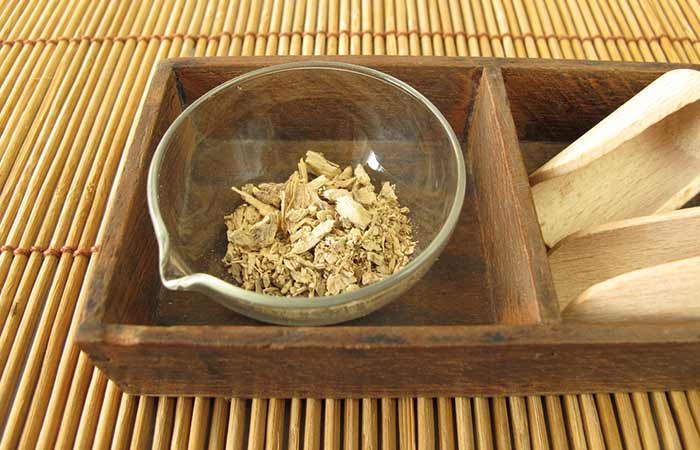According to WHO, schizophrenia affects around 21 million people worldwide (1).
Schizophrenia is a mental health disorder. An individual may not even
know that they are affected by this condition until they are diagnosed
with it.
Battling schizophrenia can prove to be quite difficult. Diagnosed individuals might struggle to manage their emotions and think clearly. They may take a while to come to terms with the fact that they actually have a mental health disorder.
While schizophrenia cannot be cured or prevented, you can definitely work towards managing its symptoms. This post lists some amazing natural remedies that can help you manage the symptoms of schizophrenia. For more information on this condition, read on.
Individuals affected by this condition exhibit the following symptoms.
Battling schizophrenia can prove to be quite difficult. Diagnosed individuals might struggle to manage their emotions and think clearly. They may take a while to come to terms with the fact that they actually have a mental health disorder.
While schizophrenia cannot be cured or prevented, you can definitely work towards managing its symptoms. This post lists some amazing natural remedies that can help you manage the symptoms of schizophrenia. For more information on this condition, read on.
What Is Schizophrenia?
Schizophrenia is the medical term used to define a mental health disorder that is characterized by symptoms of hallucinations, delusions, and other cognitive problems. First onset is usually in late adolescence or early adulthood. Most often than not, schizophrenia is a lifelong struggle.Individuals affected by this condition exhibit the following symptoms.
Signs And Symptoms
The symptoms associated with schizophrenia are categorized into four types. They are:a. Positive Symptoms: These symptoms are also known as psychotic symptoms. They include:
- Hallucinations
- Delusions
- Catatonia – It causes an individual to remain in a fixed position for a long time.
- Lack of emotions, expressions, and motivation
- Reduced speech and energy
- Social withdrawal
- Poor hygiene and grooming
- Loss of interest in life
- Inability to understand and make decisions
- Difficulty in focusing and paying attention
- Difficulty in remembering things and/or communicating
Types Of Schizophrenia
In the past, schizophrenia was divided into the following subtypes:- Paranoid schizophrenia
- Disorganized (hebephrenic) schizophrenia
- Catatonic schizophrenia
- Childhood schizophrenia
- Schizoaffective disorder
Experts believe that several factors might trigger schizophrenia. They are listed below.
Causes And Risk Factors
Factors that contribute to the development of schizophrenia are:- Genetics – A family history of the condition
- Imbalance of chemicals (neurotransmitters) like dopamine and serotonin in the brain
- Brain abnormalities
- Exposure to viral infections or trauma before birth
- Substance abuse (marijuana or LSD)
- Too much stress
- Hormonal imbalances
- Viral infections
Diagnosis
The doctor begins by analyzing your complete medical history. In some cases, a physical examination may also be carried out.There are no specific lab tests to diagnose schizophrenia. But your doctor may carry out blood tests and brain imaging studies to rule out other illnesses and substance abuse. You may be referred to a psychiatrist or psychologist to treat your condition.
Treatment for schizophrenia is usually all about managing the symptoms and preventing the condition from getting worse. Listed here are some home remedies that can reduce the severity of your symptoms, helping you manage schizophrenia better.
Home Remedies To Manage Schizophrenia
1. Green Cardamom
You Will Need
- 2-3 chopped green cardamoms
- 1 cup of water
- Sugar or honey
What You Have To Do
- Add two to three chopped cardamoms to a cup of water.
- Bring it to a boil in a saucepan.
- Simmer and strain.
- After the tea cools down a bit, add some honey or sugar to it.
- Drink the warm cardamom tea.
How Often You Should Do This
You can drink cardamom tea twice daily.Why This Works
Cardamom is a popular herbal remedy used for treating anxiety. It can help in managing symptoms of schizophrenia – like hallucinations and delusions – that can cause anxiety (2).2. Holy Basil Leaves (Tulsi)
You Will Need
- 12-15 basil leaves
- 1 cup of water
What You Have To Do
- Add 12 to 15 holy basil leaves to a cup of water in a saucepan. Bring it to a boil.
- Simmer for 5 minutes and switch off the gas.
- Allow the tea to steep for another 5 minutes.
- Strain and drink the basil tea.
How Often You Should Do This
You can drink this tea 1 to 2 times daily.Why This Works
Holy basil is an Ayurvedic remedy used to treat various health disorders. It possesses cognition-enhancing and stress-relieving properties that can help manage schizophrenia (3).3. Vitamins
B vitamins like vitamin B9 and B12 as well as vitamin D may hold great significance in the treatment of schizophrenia (4). Most schizophrenia patients have shown a deficiency in these vitamins. Thus, increasing their intake can help manage the symptoms.Foods rich in vitamin, B9, and B12 are egg yolk, cheese, avocado, broccoli, fish, poultry, and eggs. You can start by consuming more of these foods and then visiting your doctor if you want to take additional supplements for these nutrients.
4. Ginseng
You Will Need
100-200 mg ginseng supplementWhat You Have To Do
- Take 100 to 200 mg of ginseng supplement once daily.
- Consult your doctor before taking any additional supplements.
How Often You Should Do This
You must use this only as a short-term remedy and not for more than a couple of months.Why This Works
Panax quinquefolius (American ginseng) exhibits antipsychotic effects. It helps in managing the negative and cognitive symptoms of schizophrenia (5).5. Ginkgo Biloba
You Will Need
60-120 mg of ginkgo biloba supplementWhat You Have To Do
Consume 60 to 120 mg of ginkgo biloba supplement daily. Seek a doctor’s advice before taking any supplement to know the dosage suitable for you.How Often You Should Do This
Take this supplement either once or 3 times daily in divided doses.Why This Works
Ginkgo biloba can help reduce negative schizophrenia symptoms with its antipsychotic activities. It can also assist antipsychotic drugs like clozapine in working better (6).6. Omega-3 (Fish Oil)
You Will Need
500-1000 mg of omega-3 supplementsWhat You Have To Do
- Consume 500-1000 mg of omega-3 supplements daily. Consult your doctor before doing so.
- Alternatively, you can consume more of omega-3 rich foods like fatty fish, flaxseed, walnuts, and chia seeds.
How Often You Should Do This
Consume omega-3 supplements once daily.Why This Works
Omega-3 fatty acids can help mitigate the course and symptoms of schizophrenia (7). They can also help improve the behavioral aspects while reducing cognitive symptoms.7. Brahmi
You Will Need
500 mg of brahmi supplementWhat You Have To Do
Consume 500 mg of brahmi supplement once daily. Make sure you consult a doctor before taking any supplements for schizophrenia.How Often You Should Do This
Do not take this supplement more than once daily.Why This Works
Brahmi, also known as Bacopa monnieri, is a widely used herb in Ayurveda. It enhances cognitive abilities, improves the positive symptoms of schizophrenia and can also help manage symptoms of depression and anxiety (8).8. Ashwagandha
You Will Need
250-500 mg ashwagandha supplementWhat You Have To Do
Take 250 to 500 mg of ashwagandha supplement daily. Consult your doctor to know the suitable dosage for you.How Often You Should Do This
You can take ashwagandha supplement 1 to 3 times daily as per the guidance of your healthcare provider.Why This Works
Ashwagandha has anti-inflammatory and immunomodulatory properties that can help in managing the negative as well as general symptoms associated with schizophrenia (9). It can also be used as an adjunct to other antipsychotic drugs.9. Chamomile
You Will Need
- 1 teaspoon of dried chamomile
- 1 cup of water
What You Have To Do
- Add a teaspoon of dried chamomile to a cup of water.
- Boil it for a while and then switch off the stove.
- Allow the tea to steep for at least 5 to 10 minutes before straining.
- Drink the hot chamomile tea.
How Often You Should Do This
You can drink this tea twice daily.Why This Works
Chamomile tea is a great remedy for dealing with symptoms of stress and anxiety. It helps promote sleep and alleviates depression (10). It is, therefore, a useful way to manage schizophrenia.10. Indian Gooseberry (Amla)
You Will Need
2-3 Indian gooseberriesWhat You Have To Do
Consume 2 to 3 Indian gooseberries daily.How Often You Should Do This
You can consume the gooseberries all at once, or one at a time at regular intervals.Why This Works
Daily consumption of Indian gooseberry can enhance your cognitive abilities and improve the functioning of your brain, thereby making it an excellent remedy for alleviating the symptoms of schizophrenia (11).11. Licorice Powder
You Will Need
- 2 teaspoons of licorice powder
- 2 cups of water
What You Have To Do
- Add two teaspoons of licorice powder to two cups of water and mix well.
- Bring this mixture to a boil in a saucepan.
- Simmer until the licorice mixture reduces to half its initial volume.
- Strain and allow the mixture to cool a bit.
- Drink the licorice solution.
How Often You Should Do This
Drink this mixture once every morning and have your breakfast only after 1 hour.Why This Works
Licorice (Glycyrrhiza glabra) powder helps to enhance one’s cognitive abilities like memory and learning. Thus, it can be used to mitigate the cognitive symptoms of schizophrenia (12).12. Carrot
You Will Need
1-2 carrotsWhat You Have To Do
Eat 1 to 2 carrots daily. You can either add them to your favorite salads/dishes, eat them directly, or juice them.How Often You Should Do This
Consume carrots daily.Why This Works
Carrots are rich sources of niacin, also known as nicotinic acid (vitamin B3). Niacin helps attenuate symptoms of depression and anxiety while also improving cognitive abilities in schizophrenia patients (13), (14).13. Spinach
You Will Need
½ cup of cooked spinachWhat You Have To Do
Consume at least half a cup of cooked spinach. You can either cook spinach alone or add it to other dishes.How Often You Should Do This
Have spinach once daily to benefit from this remedy.Why This Works
Spinach is a rich source of folate (vitamin B9). Schizophrenic individuals are often deficient in folate, and restoring this deficiency can help reduce the severity of the symptoms (15).14. Kava Kava
You Will Need
- 1 tablespoon of powdered kava
- 1 glass of water
What You Have To Do
- Add a tablespoon of powdered kava to a glass of water.
- Mix well for about 10 minutes.
- Strain any remaining kava root from the solution.
- Drink the mixture.
How Often You Should Do This
Drink this once daily or as suggested by your healthcare provider.Why This Works
Kava is extracted from the roots of a plant belonging to the pepper family. It is a sought-after remedy in treating psychotic problems like anxiety, which makes it a wonderful option for managing symptoms of schizophrenia (16).The above remedies will help you manage the symptoms of schizophrenia to a great extent. However, severe cases might need to be treated medically. A few of these treatment methods are listed below.
Other Treatment Methods
- Antipsychotic medications like Chlorpromazine (Thorazine), Fluphenazine (Prolixin), and Olanzapine (Zyprexa).
- Coordinated Specialty Care (CSC) – This involves medicines and therapies, along with social services, family support, and educational intervention to help individuals with schizophrenia.
- Electroconvulsive therapy (ECT) – It involves delivering a small electric shock while the patient is asleep.
- Psychosocial therapies like rehabilitation, cognitive remediation, individual psychotherapy, group therapy, and family therapy to help with behavioral, psychological, social, and occupational problems.
While there is no way to prevent the development of schizophrenia, the affected individuals can follow these tips to manage the condition.
Tips To Manage Schizophrenia
- Talk to a doctor who will tailor a treatment plan suited to your lifestyle, goal, and personality.
- Put together a trustworthy treatment team that includes a healthcare provider, psychiatrist, therapist, and possibly, a social worker.
- Know what to do when you experience a schizophrenic episode.
- Develop a routine as it is more comforting for your mental health.
- Get plenty of sleep and avoid stress.
- Eat well.
- Exercise regularly.
- Be aware of the triggers.
Source Click here















Comments
Post a Comment